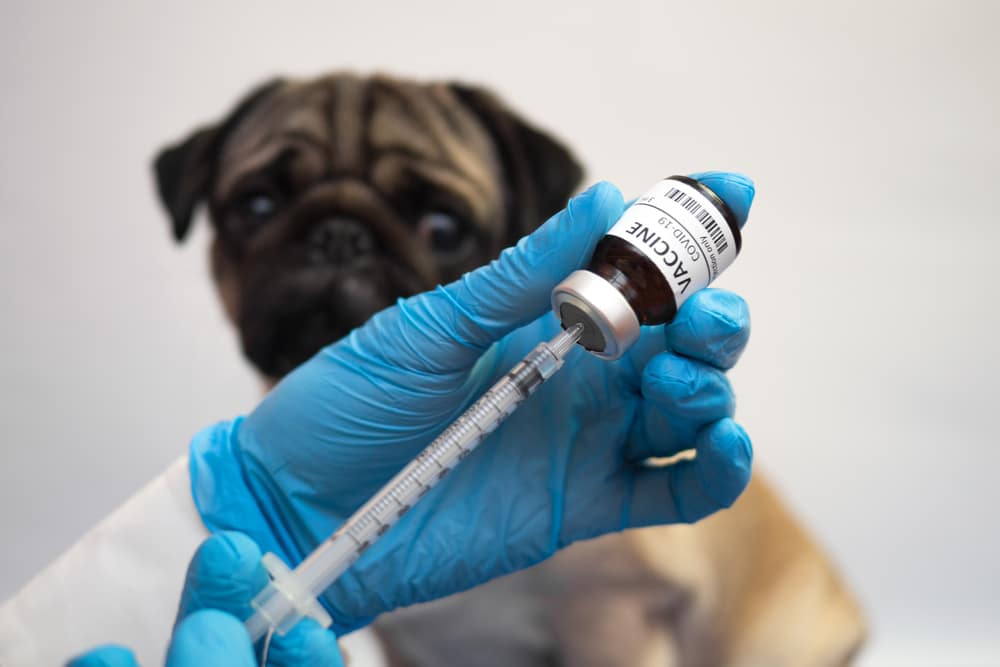The pandemic has proven the benefits of vaccinations. They help reduce the symptoms of otherwise deadly diseases. Dogs get sick, just like we do. So, you may be wondering, should I get vaccinations for my dog?
Unless your dog has an underlying condition that prevents them from being vaccinated, vaccines are the best way to prepare your dog’s immune system to fight off invading bacteria and viruses. Unvaccinated animals may develop more serious forms of the illness or disease, making them susceptible to severe complications and even death.
Table of Contents
What Are Vaccines?
Vaccines are biological suspensions containing a modified, killed, or weakened form of the organism that causes certain illnesses or diseases. They are a safe and effective way to protect our pets from otherwise deadly illnesses and diseases before they become exposed.
Many vets inject vaccines. Others administer them via capsules, sprays, eye drops, water additives, and more. almost always inject dog vaccines under the skin or into their muscle.
How Do Vaccines Work?
Vaccines work by exposing the body’s immune system to a smaller, more manageable dose of the disease-causing agent or pathogen.
The immune system is made up of a network of cells and chemical signals that fight off invading pathogens. In most cases, the frequency of exposure will enhance the efficiency of the response. This means that animals that come into contact with the pathogen more frequently will likely learn to fight it off better. This is because the immune system creates a “memory” for that particular disease. This memory can easily be recalled to bring about a faster response than in animals with no previous memory of the disease.
Most animals create these memories following infection with the actual disease. This is natural immunity. Unfortunately, some diseases are too dangerous to risk natural exposure. This is where vaccines come in.
By exposing the body to a much smaller or weakened dose of the pathogen, vaccines help to stimulate the immune system and promote the creation of memory for that particular disease. So, in the event your dog becomes infected with the actual disease, it already has a protective system in place to help it fight it off before it becomes too serious.
Dogs that have been vaccinated will often show fewer or even no signs of illness. They are also much more likely to recover completely than those that are naive, otherwise known as being previously unexposed.
When To Start Vaccinating Your Pet

Puppies are born with immune “memory” from their mother’s immune system and are usually protected for the first few weeks of life. As this protection begins to dwindle, however, they are left exposed and vulnerable because their immune systems are not yet fully developed.
Protection from their mums will usually last until they are 8 to 20 weeks old, after which they’re on their own. Some puppies whose mums didn’t have a great immune memory may be at risk at a younger age.
Because of this, we begin vaccinations as early as 6 weeks old and continue them until the puppy is 16 weeks old or older, at 2-4 week intervals. By then, the pups should have a sufficiently developed immune system with enough memory to protect them from that particular disease in the future. Unfortunately, the benefits of vaccines don’t last forever, and the shots given in puppyhood need to be boosted every 1 to 3 years to remain effective.
The exact schedule will be determined by your veterinarian. This depends on many factors, including your location, the age of the initial vaccination, and the type of vaccines used.
Are Vaccines Expensive?
The cost of vaccinating your pets also depends on many of the same factors. Dogs require the most vaccine doses in their first year of life. So, you can expect to spend the most during this period.
It’s worth noting that young puppies are most vulnerable to many illnesses and diseases and are at the highest risk of severe complications. If infection occurs at this stage, treatment isn’t guaranteed to save your pet. Also, the cost of therapy for the ongoing issue is much, much higher than the cost of a preemptive vaccination.
Furthermore, many pet insurance companies now provide plans that cover routine procedures such as vaccination for your pet.
Complications Of Vaccines
As with any medical intervention, vaccines do potentially have some side effects you should watch out for. The most common side effects are swelling at the injection site, fever, lethargy, and a reduced appetite. These signs are the result of your pet’s immune system preparing to fight off the new invaders and should last a maximum of one to two days. Allow your pets to rest and recuperate, and don’t force any vigorous exercise during this period. If symptoms last any longer, please contact your veterinarian.
Some dogs are allergic to certain ingredients in the vaccine and may produce skin redness, swelling, or hives soon after the injection as well. Others may vomit or have diarrhea. You should contact your veterinarian immediately if any of these symptoms occur. In addition, always make sure to inform your veterinarian of your pet’s condition before their next booster vaccine.
Conclusion: Should I Get Vaccinations For My Dog?
In the long run, vaccines are a much simpler, more cost-effective, and more efficient way to prevent serious complications of some common illnesses and diseases caused by viruses, bacteria, and other organisms. The cost and side effects of vaccination are far outweighed by the risk of allowing your pet to contract the disease unprepared. The type and frequency of vaccination will depend on many factors, and your veterinarian will likely recommend the most suitable plan for you and your pet.
So, what’s got you thinking about vaccinations for your dog? What did you find most useful in our article? Let us know in the comments below!
